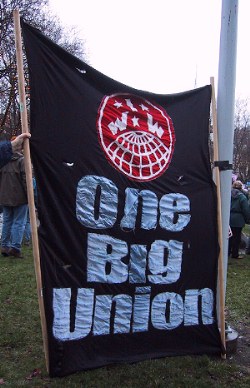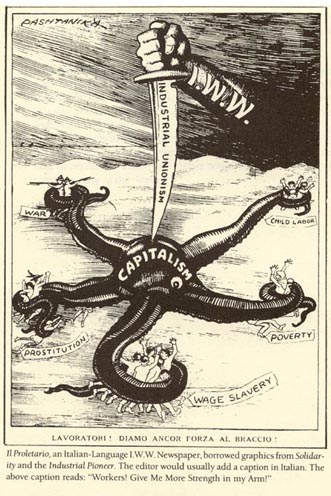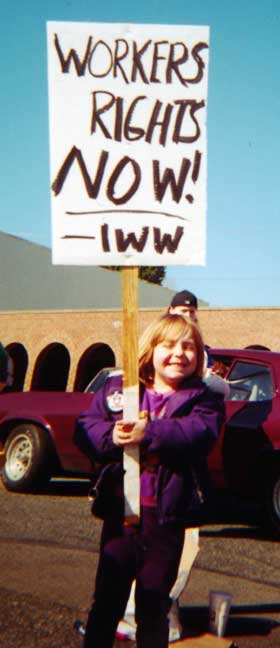Monday, September 04, 2006
The IWW and Starbucks
Huh? A union that won't sign contracts?
The IWW believes that contracts merely negotiate the rate of exploitation (true enough), are usually based on painful concessions made by workers in negotiation (again, it happens), and offen include no-strike clauses that make it illegal to carry out a work stoppage at any time except when the contract is up (which these days seems to be every twenty years).
This last part is certainly true, too, most of the time. Then again, it's "illegal" for Detroit teachers to strike and I am proud to say they are picketing on my street as I write! Anyway, it is for these reasons that the IWW, as a labor union that represents workers in a workplace, does not negotiate or sign contracts.
I understand this reasoning, and most people who believe labor creates wealth would have a hard time disagreeing on paper. But I also understand why every other labor union fights for a signed contract between owners and workers. Although we know that bosses stretch and peel away at contracts in a million subtle and nonsubtle ways everyday, they are nonetheless a set of rules that workers had a say in creating. Honestly, bosses don't want contracts, either. One of these days we'll have massive, reborn workers movement that will simply assume authority on the shop floor... and until then I want something in writing spelling out what the bosses is not allowed to do and that we're entitled to. And here's some news to the top brass of the US labor movement: contracts should get better every time! Of course, that's half the fight right there.
All this makes me fearful that Starbucks will run right over the IWW.
All the talk about the IWW being too radical or too leftwing to pull off an organizing effort on this scale doesn't bother me quite as much. I'm sure there will be more red-baiting, there always is. And I'm sure that not all employees who will want to join up (and the obvious goal is for all employees to join up) will agree with the IWW's credo of abolishing the wage system.
At the same time, the IWW has had real successes at Starbucks so far.
They went to the National Labor Relations Board and got three IWW members
their jobs back and won a verdict against company surveillance of union activists. During the public campaign the IWW organized solidarity pickets at Starbucks around the world. Coffee consumers were treated to a robust Wobbly chorus and rally outside a Starbucks in Endinburgh, Scotland. I'm guessing the UFCW could not have pulled that off, and wouldn't have even thought of it. I won't deny that the political radicalism of the IWW gives them a certain edge insofar as they are willing to be attention-getting, internationalist, and action-oriented where other unions (who may be stronger or better organized) are simply not. It also must be said that the demands being put forward by the IWW's Starbucks Union are pretty straightforward and are the kind of thing that any coffeeshop worker (that's been me at many various points) could connect with and get behind.
We are Starbucks Workers Coming Together for:
- Increased pay and raises
- Guaranteed hours with the option of fulltime status
- An end to understaffing
- A healthier and safer workplace
And for all their scant resources, the IWW sure don't have a thick layer of blockheaded beauracrats standing in the way of organizing like most other unions do. The IWW have always had a scrappy energy you can't deny. But they have also made their home largely on the far left and anarchist milliues for the last couple decades as apposed to the labor movement, which can make you rusty when it comes to mobilizing a workplace. This is surely the most ambitious IWW project since the Lowell textile mills! If they are going to pull it off they need our help.




Starbucks workers add shot of unionizing
Historic local group works with baristas
By Ron Grossman
Published September 4, 2006
In the city of its birth, and 101 years later, the Industrial Workers of the World is still trying to strike a blow for the working class.
Just ahead of Labor Day, baristas at the Starbucks in Logan Square told management that they wanted to be represented by the IWW. A veteran of battles that once made the union movement a major force in American life, the IWW has been largely moribund recently.
"We thanked them for saving us the printing costs," said Joe Tessone, 21, a barista and IWW organizer.
The preamble reads: "There can be no peace so long as hunger and want are found among millions of the working people and the few, who make up the employing class, have all the good things of life."
The match of cheery Starbucks baristas and one of the nation's oldest fire-breathing labor organizations may seem curious. Certainly a century ago, when the union held its inaugural meeting on June 27, 1905, no one could imagine that the nation's economy would be dominated by McDonald's, Home Depot and other giant chains.
But a line of continuity joins the vision of the original "Wobblies," as they were known to friend and foe, and their latter-day disciples in Logan Square. The IWW set out to organize the unorganized--low-paid, often itinerant workers in the mines, mills and lumber camps that were the backbone of the nation's economy.
Times change, smokestack industries vanish, but the lot of those at the bottom of the food chain remains much the same, Tessone said. He said beginning baristas at the Starbucks where he works make $7.50 an hour. He and fellow organizer and barista Christine Morin think the employees should make a minimum of $10 an hour, likening their fight to the big-box ordinance passed by the Chicago City Council.
"We work very hard for a very profitable company and deserve a living wage," Tessone said.
Officials at Starbucks' headquarters in Seattle could not be reached for comment.
Midway through an interview with Morin and Tessone on the patio of the Logan Square Starbucks, another worker sheepishly said she had been sent to tell a reporter and photographer that the conversation had to be taken off company premises.
Old-time Wobblies would be tickled by a dustup over who could say what and where.
"They carried the original fight for free speech," said Les Orear, 95, president of the Illinois Labor History Society and a union organizer in the 1930s. "They'd get up on a soapbox and preach the right of men and women to organize, knowing the sheriff would show up and throw them in jail."
Currently, a war of words is being fought on bulletin boards and over the counters of the Logan Square Starbucks. Morin said management has posted memos warning employees that the IWW is a radical organization, outside the mainstream of the union movement.
Morin said she and Tessone devised a counterattack. At Starbucks, employees are known as "partners."
"But we've started greeting each other as `fellow worker,'" said Morin, 21.
Store patrons have taken up the linguistic battle.
"One customer came in singing: `There once was a union maid, she never was afraid, of goons and ginks and company finks,'" Tessone said.
The lyrics are in "The Little Red Song Book," a collection of union songs still published by the IWW.
Songs and humor always were a big part of the IWW, said Franklin Rosemont, who operates Charles H. Kerr, a Chicago-based publisher of Left literature for more than a century.
"I'm glad to see humor playing a role again," said Rosemont, 62. "Starbucks, a billion-dollar operation, being taken on by the Wobblies, who never had more than $75 in their treasury."
Tessone said he was inspired to join that parade by the IWW's spirit of self-help. A friend in Joliet, where he grew up, introduced him to the organization, which also is working with Starbucks workers in New York City. Tessone was impressed by its grass-roots flavor--and price. Dues were $6 a month.
"I'm a volunteer organizer," he said. "We all are."
The IWW was formed not only to take on the factory owners, but as a challenge to the more conventional union tactics, said Clancy Sigal, a Hollywood screenwriter. Sigal recently published "A Woman of Uncertain Character," a memoir of growing up in Chicago in an Old Left household.
"The older union leaders said they wanted a bigger slice of the pie for their members," Sigal said. "The Wobblies said we want to bake a new pie."
But the IWW ranks were thinned by a backlash against communism after World War I. When the IWW held a centennial reunion in Chicago last year, its membership was estimated at 2,000 nationally, with perhaps 75 local members.
On Logan Boulevard, the struggle currently lies in the balance. Tessone and Morin said some of the 16 store workers are interested in having the IWW as their bargaining agent; others are non-committal.
"But nobody is Red-baiting us," Tessone said. "Except for the company, which keeps saying the IWW is bunch of radicals."






